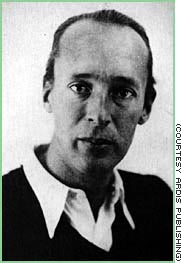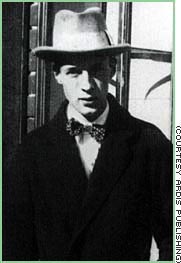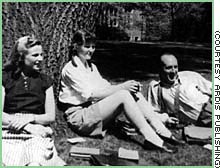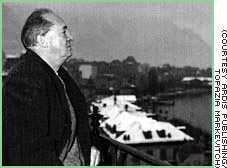MAIN | BIOGRAPHY | PICTORIAL BIO | BUTTERFLIES PHOTO ESSAY | LOLITA'S IMPACT
ARCHIVES | ROADMAP | LOLITA AND MORALITY | QUIZ | POLL | BOARDS | LINKS
The Man

|
|
| Nabokov in Menton, 1937-38 | |
April 9, 1999
Web posted at: 5:36 p.m. EDT (2136 GMT)
(CNN) -- Vladimir Vladimirovich Nabokov is known as one of the century's great writers, particularly as the author of "Lolita." But he had many more dimensions, and in the end of his life he became the Eccentric Writer, one who avoided publicity at all costs (even declining election to the National Institute of Arts and Letters), preferring a quiet life engaging in creation and Lepidoptera.
Born on, or about, April 23, 1899 in St. Petersburg, Russia, Nabokov's childhood was spent in storybook fashion. The oldest of five children, he grew up in a wealthy and aristocratic family, shuttling between the family's two homes (one in St. Petersburg, and the other -- an estate -- 50 miles south in the countryside). He enjoyed playing tennis and soccer, but spent hours at a time embroiled in his passion -- chasing and collecting butterflies, a hobby he apparently learned from his father.
|
At the time, Russia was under the rule of Tsar Nicholas II, and Nabokov's father, Vladimir Dmitrievich Nabokov, was a respected (and to authorities, controversial) liberal politician. In fact, the elder Nabokov was imprisoned for 90 days in 1908 for signing a political manifesto. Nabokov's mother, Elena Ivanova, raised her three boys and two girls with the help of several governesses and tutors who taught the Nabokov children French and English, along with Russian.
|
At the highly regarded Tenishev School, which Nabokov began attending in 1911, he was described as an aloof, even conceited, student who arrived each day in the family's Rolls-Royce.
But Nabokov's dreamy childhood would receive a wake-up call with the Bolshevik revolution and the abdication of Tsar Nicholas II. Rioting forced his family to move, eventually, to England in 1919 where Nabokov and his brother enrolled in Cambridge. Nabokov majored in French and Russian literature.

|
|
| Nabokov in Berlin, 1923 | |
Meanwhile, his father had settled the family in Berlin. But tragedy was waiting -- in 1922, Nabokov's father was murdered while trying to stop an assassination attempt on politician Pavel Miliukov. According to Donald E. Morton in his book, "Vladimir Nabokov," after his father's death, Nabokov returned to school for his last term, "with the determination to do well." He graduated later that year.
In 1923 Nabokov moved to Berlin, where he wrote poetry and short stories for "The Rudder," the Russian newspaper his father founded. And he met the woman with whom he would spend the rest of his life. Nabokov and Vèra Slonim, also a Russian émigré, married in 1925.
Nabokov's first Russian novel, "Mary," was published that year. As Nabokov's writing career slowly took form in the 1930s, he and Vèra moved from Berlin (again, for political reasons, as the Nazis grew in force) to Paris, before fleeing the war-torn City of Light for New York in 1940, with their son, Dmitri -- born in 1934.

|
|
| Nabokov, Dmitri and Vèra | |
At this point Nabokov, at 41, had generated some buzz in the book industry, but he had yet to reach an English-speaking audience and was far from the acclaim he would attain. Though he inherited a healthy share of his family's wealth, he still attempted to earn a living through various jobs, even relying on his old passion -- butterfly collecting -- to win a position at the Museum of Natural History in New York.
"It was as if Nabokov was a bigamist, as if he had two wives he loved passionately, literature and Lepidoptera," wrote his principal biographer, Brian Boyd. In fact, Nabokov's work in the field of Lepidoptera includes the naming of several butterflies, and authorship of published scientific studies.
Nabokov and Vèra spent the next 20 years in the United States where Nabokov wrote novels, plays, poetry and non-fiction in English and lectured at Stanford, Harvard and Wellesley. His first English novel, "The Real Life of Sebastian Knight," was published in 1941. He also was published in "The New Yorker" and other respected publications.

|
|
| Nabokov and his Wellesley students, c. 1945-46 | |
Despite his shyness ("Socially, I am a cripple," he once said), Nabokov never hesitated to correspond through letters that were often humorous, caustic, or a mix of both.
When a short story he wrote was rejected by "The New Yorker" in 1951, he wrote to them: "I hope to be in New York end of May ... Before then I hope to send you another story which will come back to me in a 'Rush' envelope ..."
In 1961, when a London publication asked him in a letter how he wrote, when he wrote, where he wrote and how he found inspiration, Nabokov had his wife send a letter back with the answers to each question: "1. Pencil 2. Anyhow 3. Anywhere 4. It finds me ..."
|
Meanwhile, Nabokov pursued his favorite hobby, collecting butterflies during his visits to the Rocky Mountains. It was during these trips in the early 1950s that Nabokov composed the work that would define him. "Lolita" was a hard sell to publishers, but by the end of the decade, with Nabokov now 60, the book was such a hit that the sales of the novel, the movie rights and screenplay deal allowed him to focus on writing.

|
|
| Nabokov on his Montreux balcony | |
In 1961, seeking privacy, he and Vèra moved to Montreux, Switzerland, where they remained until he died in 1977 of a viral infection. In the final 16 years of his life, Nabokov published several novels, including the well-received "Pale Fire" and "Ada or Ardor: A Family Chronicle," which Nabokov felt was his best work. He also worked closely with his son, translating his earlier Russian works to English.
Boyd, describing a scene shortly before Nabokov's death, says Dmitri visited with his father and kissed his forehead upon leaving. Nabokov's eyes welled with tears.
"When Dmitri asked him why," Boyd wrote, "he replied that a certain butterfly was already on the wing, and his eyes made clear that he never expected to see it again."